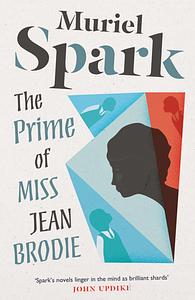Take a photo of a barcode or cover
This kind of wry, psychologically incisive writing is my favorite thing in the whole world. The book is so brief, and left me so stimulated and hungry, that I turned around almost immediately and read it a second time.
The titular Miss Jean Brodie is an progressive-minded schoolteacher who handpicks a group of girls to mold according to her aesthetics and values. Muriel Spark situates Jean Brodie squarely in a type -- "It is not to be supposed that Miss Brodie was unique at this point of her prime," begins one incisive passage that describes the "legions of her kind during the nineteen‐thirties, women from the age of thirty and upward, who crowded their war‐bereaved spinsterhood with voyages of discovery into new ideas and energetic practices in art or social welfare, education or religion." But Miss Brodie's cultivation of the minds of her girls is not just about passing the fruits of her self-improvement on to another generation. There's something cruel and sinister about it, something desperate in the way she pits the girls against the rest of the school, the way she favors and manipulates them.
Miss Brodie teaches the girls for only two years, when they are eleven and twelve, but she remains intimate with the selected "Brodie set" through their teens, after they have moved on to other teachers and other pursuits, with trips to museums, galleries, and shows, casual golf games, tea and luncheon at her home, and even at the home of her lover, the school's music master. Such a boundary-shattering student-teacher relationship is rather shocking to me, and I don't think the book presents it as unremarkable so much as inevitable. After all, Spark tells us, Miss Brodie has selected as the members of her set "those whom she could trust; or rather those whose parents she could trust not to lodge complaints about the more advanced and seditious aspects of her educational policy, these parents being either too enlightened to complain or too ... trusting to question the value of what their daughters were learning at this school of sound reputation."
(The whole notion of a "Brodie set" reminds me of another literary girls' school whose teachers have no sense of boundaries, that of Dorothy Strachey's [b:Olivia|679464|Olivia|Dorothy Strachey|https://i.gr-assets.com/images/S/compressed.photo.goodreads.com/books/1328856064l/679464._SY75_.jpg|665866] -- a school in which the girls self-organize into "Cara-ite" and "Julie-ite" factions professing fealty to one or the other of the school's dramatic headmistresses. As I said in my review of that book, and I think applies as well to Miss Brodie, "If all girl’s schools of the time were as dysfunctional as this one, it’s small wonder that women’s education wasn’t taken seriously.")
So the girls grow and come of age with the dominant presence of Miss Brodie looming in their lives and consciousnesses, and one of the girls in particular, Sandy Stranger, comes eventually to resent it. The slow peeling away of Sandy from Jean Brodie's grasp is the central narrative of the book, filigreed in marvelous style with the experiences of the other girls and Spark's acerbic psychological insights.
The narrative structure is filigreed too -- it leaps about spectacularly in time, often veering from the girls' final year at school to their first year with Miss Brodie, to some time during or after the war to some time much later and back again all in the space of a few paragraphs, all to reveal amusing truths at the most surprising, enlightening moments. And the marvelous thing is that Spark is completely in control throughout; the book is a master class in what omniscient narration can do in skilled, competent hands.
I can't wait to read it again.
The titular Miss Jean Brodie is an progressive-minded schoolteacher who handpicks a group of girls to mold according to her aesthetics and values. Muriel Spark situates Jean Brodie squarely in a type -- "It is not to be supposed that Miss Brodie was unique at this point of her prime," begins one incisive passage that describes the "legions of her kind during the nineteen‐thirties, women from the age of thirty and upward, who crowded their war‐bereaved spinsterhood with voyages of discovery into new ideas and energetic practices in art or social welfare, education or religion." But Miss Brodie's cultivation of the minds of her girls is not just about passing the fruits of her self-improvement on to another generation. There's something cruel and sinister about it, something desperate in the way she pits the girls against the rest of the school, the way she favors and manipulates them.
Miss Brodie teaches the girls for only two years, when they are eleven and twelve, but she remains intimate with the selected "Brodie set" through their teens, after they have moved on to other teachers and other pursuits, with trips to museums, galleries, and shows, casual golf games, tea and luncheon at her home, and even at the home of her lover, the school's music master. Such a boundary-shattering student-teacher relationship is rather shocking to me, and I don't think the book presents it as unremarkable so much as inevitable. After all, Spark tells us, Miss Brodie has selected as the members of her set "those whom she could trust; or rather those whose parents she could trust not to lodge complaints about the more advanced and seditious aspects of her educational policy, these parents being either too enlightened to complain or too ... trusting to question the value of what their daughters were learning at this school of sound reputation."
(The whole notion of a "Brodie set" reminds me of another literary girls' school whose teachers have no sense of boundaries, that of Dorothy Strachey's [b:Olivia|679464|Olivia|Dorothy Strachey|https://i.gr-assets.com/images/S/compressed.photo.goodreads.com/books/1328856064l/679464._SY75_.jpg|665866] -- a school in which the girls self-organize into "Cara-ite" and "Julie-ite" factions professing fealty to one or the other of the school's dramatic headmistresses. As I said in my review of that book, and I think applies as well to Miss Brodie, "If all girl’s schools of the time were as dysfunctional as this one, it’s small wonder that women’s education wasn’t taken seriously.")
So the girls grow and come of age with the dominant presence of Miss Brodie looming in their lives and consciousnesses, and one of the girls in particular, Sandy Stranger, comes eventually to resent it. The slow peeling away of Sandy from Jean Brodie's grasp is the central narrative of the book, filigreed in marvelous style with the experiences of the other girls and Spark's acerbic psychological insights.
The narrative structure is filigreed too -- it leaps about spectacularly in time, often veering from the girls' final year at school to their first year with Miss Brodie, to some time during or after the war to some time much later and back again all in the space of a few paragraphs, all to reveal amusing truths at the most surprising, enlightening moments. And the marvelous thing is that Spark is completely in control throughout; the book is a master class in what omniscient narration can do in skilled, competent hands.
I can't wait to read it again.
adventurous
funny
lighthearted
reflective
fast-paced
Plot or Character Driven:
Character
Strong character development:
Yes
Loveable characters:
Yes
Diverse cast of characters:
No
Flaws of characters a main focus:
Yes
lighthearted
reflective
medium-paced
Plot or Character Driven:
Character
Loveable characters:
No
Rated 3.5 stars
Sharply observed and full of sly humour, this an excellent novella to pass an afternoon with. It’s both a window to another time, and a very canny portrait of Edinburgh and Scots religion.
My only real qualms were that the ending felt somewhat rushed, and I would’ve enjoyed a little more information of the futures of each of the Brodie set (except for Mary).
Sharply observed and full of sly humour, this an excellent novella to pass an afternoon with. It’s both a window to another time, and a very canny portrait of Edinburgh and Scots religion.
My only real qualms were that the ending felt somewhat rushed, and I would’ve enjoyed a little more information of the futures of each of the Brodie set (except for Mary).
emotional
funny
mysterious
reflective
medium-paced
Plot or Character Driven:
Character
Strong character development:
Complicated
Loveable characters:
Yes
Diverse cast of characters:
No
Flaws of characters a main focus:
Yes
I expected Miss Jean Brodie to be a quirky mix of Lorelai Gilmore and Mr. Keating from Dead Poet’s Society. A more apt descriptor would be Willy Wonka, with the liberal doling out of dubious morality lessons and the being a total dick to children for no reason. She’s supposed to be this life changing teacher but walks up to a 10 year old girl and says, “you’ll never amount to anything” like that wouldn’t be instantly soul crushing.
This book sucks. There’s no other way to put it. For 130 pages it feels so long. I couldn’t finish it.
By the way, there’s at least 50 references to the future sexual prowess of the “Brodie set” ... it’s so icky.
This book sucks. There’s no other way to put it. For 130 pages it feels so long. I couldn’t finish it.
By the way, there’s at least 50 references to the future sexual prowess of the “Brodie set” ... it’s so icky.
dark
emotional
reflective
sad
fast-paced
Plot or Character Driven:
Character
Strong character development:
Yes
Loveable characters:
Complicated
Diverse cast of characters:
No
Flaws of characters a main focus:
Yes
It’s fascinating how children can feel danger without a real understanding of exactly how they’re in danger. Incredibly written coming of age story about the games abusive adults play using the children under their power.
Muriel Sparks' The Prime of Miss Jean Brodie is a witty, ironic novel that can be interpreted as a satirical critique of 20th-century Fascism, which reflects on the Fascist mode of indoctrination, the character of the fascist, and the Fascist conception of beauty which ignores it's own brutal realities, or justifies them through its objectivity.
There are also various religious connotations and themes of Scottish history, which unfortunately I am not well-versed enough in to delve into.
There are also various religious connotations and themes of Scottish history, which unfortunately I am not well-versed enough in to delve into.
Brilliant, I just love how this turned out to be much darker and deeper than the usual "inspiring teacher-impressionable students" cliché you might expect when it comes to similar plots!





